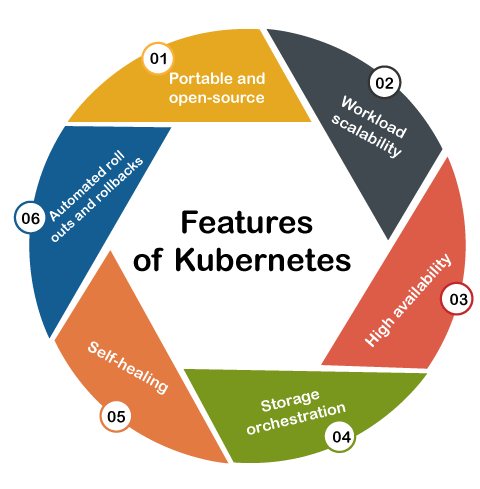Features of Kubernetes

Kubernetes is a powerful container orchestration platform that offers a range of features to automate the deployment, scaling, and management of containerized applications. Here are some key features of Kubernetes:
-
Container Orchestration:
- Kubernetes automates the deployment, scaling, and management of containerized applications, making it easier to manage complex, distributed systems.
-
Containerization:
- Kubernetes is designed to work with container technologies like Docker. It enables the deployment and management of containers, which encapsulate applications and their dependencies.
-
Automated Load Balancing:
- Kubernetes provides built-in load balancing to distribute network traffic across multiple instances (pods) of an application, ensuring efficient use of resources and high availability.
-
Service Discovery:
- Kubernetes facilitates service discovery within a cluster, allowing different components of an application to find and communicate with each other easily.
-
Automatic Scaling:
- Kubernetes supports automatic scaling of applications based on resource usage or custom metrics. It can scale applications up or down to handle changes in demand.
-
Self-healing:
- Kubernetes continuously monitors the health of applications and automatically restarts or replaces containers that fail. It helps maintain the desired state of applications.
-
Rolling Updates and Rollbacks:
- Kubernetes supports rolling updates, allowing new versions of applications to be deployed with minimal downtime. If issues arise, it supports rolling back to a previous version.
-
Declarative Configuration:
- Users define the desired state of their applications and infrastructure using declarative YAML or JSON configuration files. Kubernetes then works to ensure that the actual state matches the declared state.
-
Multi-cloud and Hybrid Cloud Support:
- Kubernetes is cloud-agnostic and can run on various cloud providers or on on-premises data centers. This flexibility makes it suitable for multi-cloud and hybrid cloud deployments.
-
Resource Management and Optimization:
- Kubernetes efficiently manages and allocates resources (CPU, memory, storage) among containers, optimizing the use of underlying infrastructure.
-
Extensibility:
- Kubernetes is highly extensible, allowing users to add or customize features through a rich ecosystem of plugins, extensions, and custom resources.
-
Role-Based Access Control (RBAC):
- Kubernetes provides RBAC to control access to resources and actions within the cluster, ensuring secure management and operation.
-
Storage Orchestration:
- Kubernetes supports various storage solutions and provides storage orchestration for containers, allowing users to attach storage resources to their applications.
-
Networking:
- Kubernetes handles networking between containers and services, ensuring seamless communication within the cluster.
These features make Kubernetes a robust platform for deploying and managing containerized applications, and its popularity has grown significantly in the container orchestration and cloud-native computing space.
Thank you,
